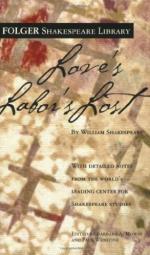|
This section contains 6,480 words (approx. 22 pages at 300 words per page) |

|
SOURCE: “Love's Labor's Lost,” in Shakespeare's Comedies: From Roman Farce to Romantic Mystery, University of Delaware Press, 1986, pp. 35-47.
In the essay below, Ornstein emphasizes the artificiality of Love's Labour's Lost as a comedy and a satire of abstruse intellectuality in conflict with love.
Like most farces Errors has to be seen on stage to be fully appreciated, partly because of its slapstick scenes and partly because its ingenious plot is inspired by the stage—by a playwright's control of the lives of his characters, who enter and exit on cue and meet or avoid each other as his comic plan requires. The relation of Love's Labor's to the stage is more difficult to assess. Most scholars agree that it was influenced by Lyly's comedies,1 but these comedies are undramatic as well as highly artificial and much too static and bloodless to succeed in the Elizabethan public playhouses...
|
This section contains 6,480 words (approx. 22 pages at 300 words per page) |

|


